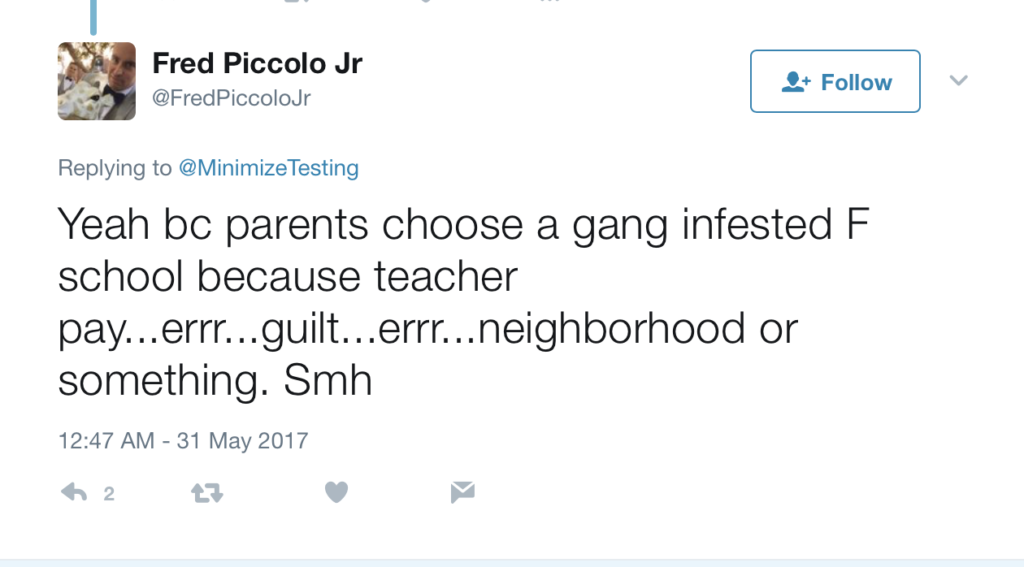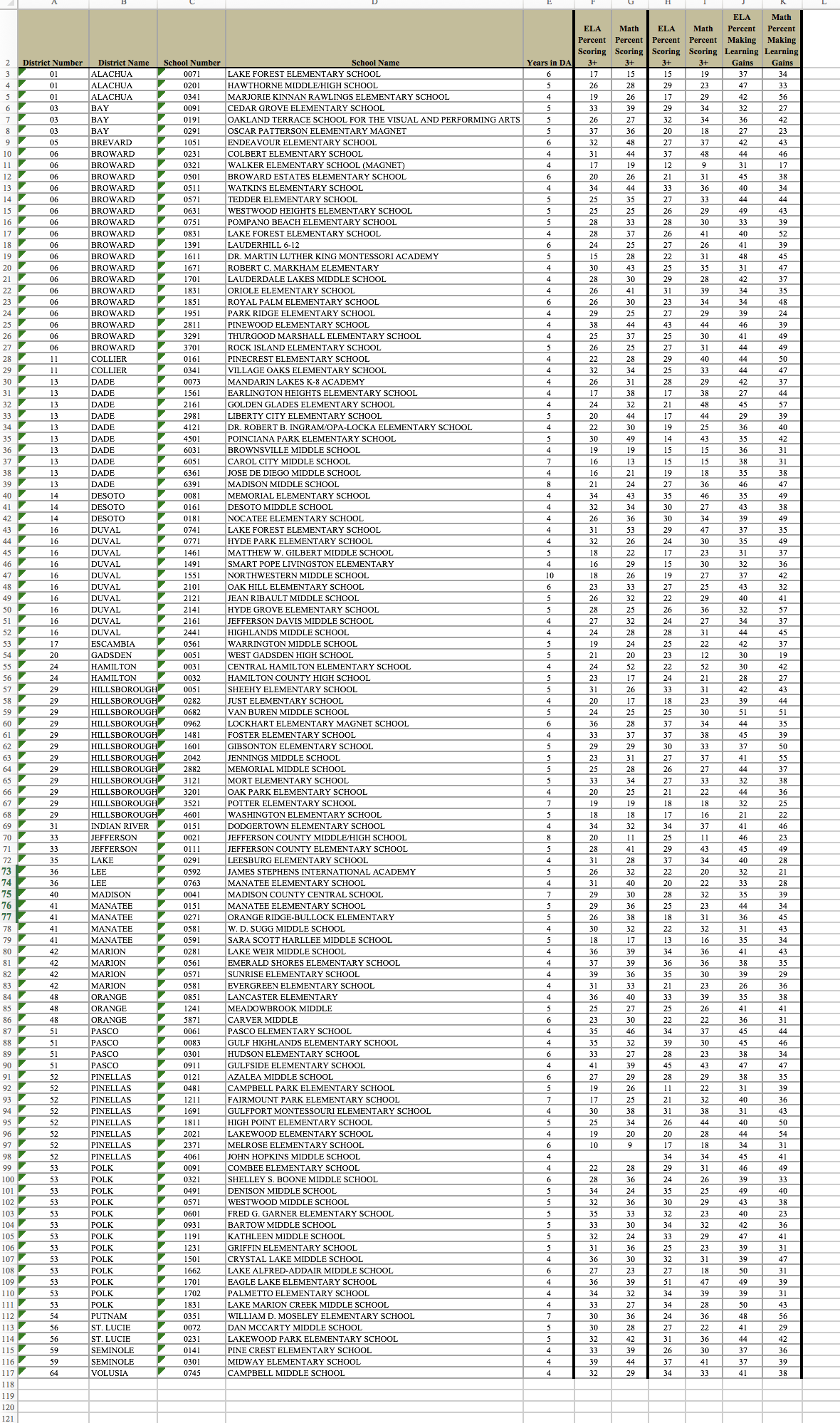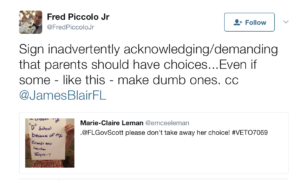Yes, Fred, Sometimes Smart Parents Choose a D School
Over the last few weeks I have been mocked by Ed Reformers when I suggest parents might want their children to go to their D or F rated school and that HB7069’s “Schools of Hope” legislation removes that choice by requiring the closure or conversion of their child’s school. There are many reasons that parents support their local public school, regardless of its school grade. Read this lovely essay, “the most common good“, describing one mother’s choice to send her daughter to a struggling school. I suspect many parents in Florida can tell you similar stories regarding their low scoring but beloved neighborhood school.
However, when parents speak out in support of traditional public schools the response from the ed reform crowd can be anything from disbelief to outright contempt.
Here is a recent response from Speaker Corcoran’s Communications Director, Fred Piccolo:
 For the record, I know of no one who wants to send their children to a gang infested school, but is that an accurate description of the 115 chronically failing schools this School of Hope plan is meant to address? It appears not.
For the record, I know of no one who wants to send their children to a gang infested school, but is that an accurate description of the 115 chronically failing schools this School of Hope plan is meant to address? It appears not.
It turns out it isn’t easy to find the “list of 115” because it isn’t posted on the FLDOE website or linked in the House documents. We were able to obtain the list from someone who got it from Speaker Corcoran’s office. Why isn’t the list posted where everyone can find it? We have been told that lobbyists were required to pick the list up, in person, from the Speaker’s office. Here it is:

The list contains schools that have had Ds or Fs for more than three years. Here is an overview:
- One school, Northwestern Middle School, in Duval, has been low performing for 10 years.
- There are only 2 high schools on the list, both are from rural districts: West Gadsden High in Gadsden County (461 students) and Hamilton County High School (694 students). Are these gang infested areas?
- There are three Middle/High Schools: Hawthorne in Alachua, Lauderhill in Broward and Jefferson in Jefferson (which was recently converted to a Somerset Charter School under the insistence of the FLBOE).
- There are 78 elementary schools on the list. The rest (32) are middle schools.
- Some of the schools on this list have already been closed with students redistributed.
- All of these schools appear to have high populations of economically disadvantaged students.
- There are reportedly another almost 100 schools who have received 1 F or 2 consecutive D’s that may be added to this list when current school grades are released.
- If the Governor signs HB7069, these schools will be given the choice to close or convert to a charter school, district managed charter or change to a private management company.
Are you surprised so many elementary schools on the list? We were. Most of the conversations surrounding turnaround legislation this session seemed to be referring to older students. Are you aware of any gang infested elementary schools on this list? Fred? Do you know something I don’t know… or are you merely judging these schools (and their parents) purely from test scores?
What is clear is there are 78 elementary schools targeted for takeover… we are talking about eliminating local kindergarten classes not gang infested high schools… we are talking about local schools serving hungry 6 year olds who lack resources…
Regardless of what happens with the shenanigans in Tallahassee regarding K-12 funding and HB7069, this list suggests that elementary schools should be a main focus of any future interventions. Schools of Hope will allow 25 low performing public schools to compete for up to $2000/student of extra funding to provide for much needed services. That won’t even cover a third of these elementary schools, leaving at least two thirds of our most struggling elementary schools without the services they need and, likely, forced into charter school conversion or closure.
Recently, Jefferson County was “encouraged” by the FLDOE to convert their two schools to charter schools. Only one qualified charter company, Somerset (a division of Academica) applied and was awarded the contract. Their first step was to ask for $5 million in extra funding for Jefferson County (which calculates to about $8,000 for each of Jefferson’s ~600 students). This extra funding For Jefferson is part of HB7069.
Why is Somerset getting $8,000 per student, while struggling public schools are asked to compete against each other to get $2,000 per student? Will the $2,000/student be offered to Schools of Hope charter operators, as well, or will they, like Jefferson, be offered more. After years of hearing the Florida State Board of Education and the FLDOE insist that spending more money on these schools would be “throwing good money after bad”, it is shocking to see the coffers opened to these out-of-state charter corporations, with little to no local accountability. What if the schools on these lists had been offered the $8,000/student “Jefferson deal” years ago? Would they still be on this list?
We hope local communities will look at the elementary schools on this list and decide that they are worth saving. We hope this list will prompt lawmakers to question whether the current test based accountability system is an accurate measure of the quality of education in low income elementary schools. Keep in mind that the FSA has never been shown to be fair, valid or  reliable for at risk subpopulations of children. Perhaps children, and their schools, really are more than a test score.
reliable for at risk subpopulations of children. Perhaps children, and their schools, really are more than a test score.
We also hope reformers, like Fred, will consider listening to the parents who are choosing these schools rather than mocking their choices as “dumb”. Perhaps these parents can offer real insight into the needs of students in these at-risk schools.
We recently wrote about wildly successful students at Rickards High, a “D” school in Leon County (read the entire blog ). A Rickards’ parent commented on the blog:
“Rickards is one of the most highly effective D schools I have ever witnessed as parent who is and was very active in the many activities this school has to offer its students. The teachers and administrators are extremely committed to educating the students that come through its doors. This is why I feel school grades are biased based socioeconomic incomes which is a horrible thing to do to our public schools and educational system.”
We do not believe the school grade system accurately measures the quality of education occurring within a school, but merely reflects student performance a few math and reading state assessments. A high quality education requires much more than merely math and reading success. When will our policy makers stop relying on a flawed accountability system that poorly judges our schools, take a deep look at what truly ails our schools, and work to properly and ethically fix our neglected communities’ schools?
It is for these reasons as well as many more, that we continue to urge the Governor to #Veto7069. Bring the legislature back next session to focus on the needs of these communities and re-evaluate the accountability system rather than continue to fail schools, catering to the demands of the charter industry.

I am familiar with one of the DeSoto County elementary schools. I assure you it is not gang infested, but rather economically impoverished. The idea that you think it’s ok to make comments on a subject that you clearly know nothing about is astounding, frightening, and ignorant.
I hope you are referring to Fred.. but we are not surprised to hear the elementary school is impoverished but not gang infested.
Somerset Academy in Duval County has a high school with two F grades and an elementary with one F and one D. Yet, Jefferson County was forced to use them as the EMO.